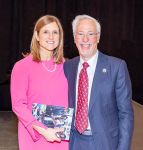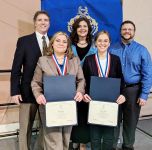News and Releases
Naugatuck Valley Community College Student Presents at Competitive Psychology Conference
Share

Locke’s poster featured a study she had done in NVCC’s two-sequenced Mentored Research Experience courses last year (RES 111 and RES 112) with Dr. Kim O’Donnell. Her study, Physical Disability and the Presentation of Anxiety, was designed to determine the relationship between physical disability and each of the cognitive-behavior model of anxiety’s symptom clusters.
According to Dr. O’Donnell, this sequence of two courses prepares students to participate in conferences like the EPA. Starting in September, students generate an idea for a research project and spend the fall semester developing specific hypotheses and a detailed plan for data collection. In the spring semester, they submit their proposal to the college's IRB (Institutional Review Board) committee and then collect, analyze, and form conclusions about their data. The course gives students a great amount of intellectual freedom while also providing significant mentoring and other support. Professor O’Donnell explains that in addition to the mentoring she provides, “students learn to work as a research team, supporting and helping each other as they learn new skills. In fact, they develop high level academic skills -- on par with what many will be asked to do at the end of a four-year degree. By the end of the course, students understand how to develop a research question in response to existing literature, how to develop valid data collection methods, how to analyze data using inferential statistics, and how to write up the results and conclusions.” RES 111 will be offered again this fall, followed in spring 2022 with RES 112.
Professor O’Donnell elaborated: “I've known Abbi through several courses at the college and she consistently performs at the highest level. However, her academic engagement and performance last year was particularly noteworthy because of the COVID-related disruption that occurred halfway through the Spring 2020 semester. The move to online learning challenged everyone, but the shift impacted this Research course in the middle of our data collection and that meant students had to function much more independently while learning and executing data analysis. Despite these extra challenges, Abbi completed all the work with extreme competence and immediately committed to applying to present at the conference when I sent the Call for Proposals to students during the Fall 2020 semester. She developed a poster using the conference's guidelines, and then went beyond the minimum requirement and offered a live question and answer session during the virtual conference.”
Abbi described the impact of the research courses on her academic and professional goals. “My experience in the Mentored Research classes substantially changed my career and educational goals. Before I started, I was afraid of conducting scientific research. Now I want to work towards getting a Ph.D. in Psychology to perform psychology research! I am fascinated by the intersection between the physical and psychological, and my experience in this class with Professor O’Donnell allowed that interest to blossom and begin to produce fruit. The conference itself was amazing. I attended multiple lectures by such established researchers that made me feel like I was standing among giants! Viewing other posters was fascinating as well.”
The Eastern Psychological Association (EPA) was founded in 1896 and is the oldest of the regional Psychological Associations in the United States. Its sole purpose is to advance the science and profession through the dissemination of professional information about the field of Psychology. EPA achieves this goal by conducting its annual meeting where the members of EPA present the latest advances in professional and scientific work to their colleagues. EPA welcomes psychologists from all fields across the discipline.
Other Naugatuck Valley Community College News
HAVE A QUESTION? EMAIL US.
Reporters and media inquiries, please contact us at











